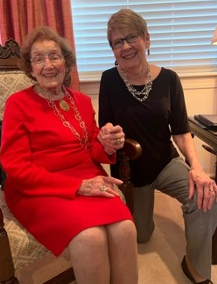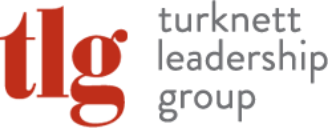
by Lyn Turknett
May 2020

This month’s newsletter is focused on teams, and I love thinking about teams. Indeed thinking about teams has been my life’s work – how leadership teams function best, why teams fail, and, more recently, what agile teams tell us about the future of enterprise. But as I try to finish this short piece I have one thing on my mind – and that is the remarkable individual that the world lost on Sunday, May 10th, 2020 – Dr. Frances Bartlett Kinne. Fran would have been 103 on May 23rd.
When we visited Fran last, on December 1st of last year, she had been interviewed earlier in the day for a CBS documentary on the Jacksonville University Cinderella team of 1970 – still the smallest team in the modern era to make it to the NCAA final four. Fran was president of JU from 1979 to 1989, but as Dean of Fine Arts in 1970 she was already the unofficial team-builder at JU – and of any organization she was ever a part of.
Lesson One
The most important lesson about teams crystallized for me on a Sunday in 2016, when I read Charles Duhigg’s article entitled
What Google Learned From It’s Quest to Build the Perfect Team. Google is data rich and data obsessed, and in 2012 embarked on Project Aristotle – a huge effort designed to figure out what distinguished their most productive teams from the other teams. After measuring everything under the sun they found some things that were important, like clear goals and norms for accountability, but the most important element – far and away the most important thing – was psychological safety. The term psychological safety was coined by Harvard researcher Amy Edmondson, and she defined it in 1999 as ‘‘a sense of confidence that the team will not embarrass, reject or punish someone for speaking up. It describes a team climate characterized by interpersonal trust and mutual respect in which people are comfortable being themselves.’’
Google found that teams high in psychological safety were not just more productive but also more innovative, and that has been corroborated by others. They share their research along with ways to build psychological safety on their
ReWork site. I wish I could go back and measure the psychological safety in teams that had Fran as a leader or member – I would bet the scores would be off the charts.
My favorite recent book about teams is Daniel Coyle’s
The Culture Code: The Secrets of Highly Effective Groups, and his first secret, unsurprisingly, is Safety.
The most important lesson for any team is that psychological safety must be high.
Coyle says that people, especially leaders, need to signal safety quickly, in the first five seconds. Fran did that. She connected immediately. I don’t remember the event, but I remember being in the back seat of a car in a line for valet parking. Fran was in the front passenger seat. She began a quick conversation with the valet, asking him, with incredible warmth, his name, whether he was in school, and what his plans for the future were. I still remember the light in his eyes. And she did that with everyone, no matter who they were.
Fran made everyone immediately feel like a better version of themselves. She convinced Jack Benny and Bob Hope to come to JU to receive honorary degrees at the same time, and I’ll bet they would both tell you that they just felt more comfortable, more real, and more capable around Fran.
Lesson Two
We have used a stage- setting slide in our work with teams for over 25 years. Entitled “The Role of the Secondary Facilitator,” I believe that it came originally from Xerox. When we began work with executive teams decades ago, most were composed of white males with out-sized egos. It amazed me how this simple slide shifted behavior and made conversation more productive. The framing idea was that while I might be facilitating, everyone in the group had an important role as a “secondary facilitator,” and to that end needed to follow certain rules:
- Balance your own participation
- Say what needs to be said – take risk
- Don’t dominate
- Bring in others who aren’t participating
- Maintain an attitude of respect
- Be present – pay attention
- Stay with the topic
- Take personal responsibility for the discussion
I am not sure how important the specific norms are, but I am sure that explicitly spelling out the norms is critical. The difference in a meeting with explicit norms and a meeting without is dramatic.
We now have teams create their own team charters and spell out “Operating Guidelines” in their own language, but I firmly believe that the most important things are that the guidelines be written, and that the reminders be frequent.
So, Lesson Two is that codes are key.
Fran was an explicit conveyor of her values, and I imagine that she set the stage well with any team. She said frequently that she learned from her mother, “Life is not about us. Life is about others.” She lived with humility and respect combined with extreme optimism and extreme confidence and she instilled that “culture” into even a dinner table conversation.
Lesson Three
Lesson Three is one that anyone in any organization knows by heart –
the leaders, and the leadership team, set the culture and the behavioral norms throughout the organization. And effective, trustworthy leadership teams create cultures of engagement and high performance.
I would love to have been on a team led by Fran Kinne. Fran was President of JU one of the first times I visited the JU campus, and I remember talking to the person who was leading the tour Bob and I were on. She had graduated the May before, but had stayed on at JU because she had a chance to “work with President Kinne.” I have never heard anyone talk more excitedly about their work.
Bob has always said that since having Dr. Kinne as his humanities teacher in 1960 he has guided his life by her example, often asking when in a dilemma, “what would Fran do”? There are so many people who are better versions of themselves because of knowing Fran – better friends, better spouses, better leaders, better people.
We will forever be on her team.
“Listen to her carefully: Fran Kinne never says that. She never says, ‘I was the first,’” Cost said. “Never. I’ve never heard her brag. I’ve never heard her put herself into a story so the story was about her.”

 This month’s newsletter is focused on teams, and I love thinking about teams. Indeed thinking about teams has been my life’s work – how leadership teams function best, why teams fail, and, more recently, what agile teams tell us about the future of enterprise. But as I try to finish this short piece I have one thing on my mind – and that is the remarkable individual that the world lost on Sunday, May 10th, 2020 – Dr. Frances Bartlett Kinne. Fran would have been 103 on May 23rd.
When we visited Fran last, on December 1st of last year, she had been interviewed earlier in the day for a CBS documentary on the Jacksonville University Cinderella team of 1970 – still the smallest team in the modern era to make it to the NCAA final four. Fran was president of JU from 1979 to 1989, but as Dean of Fine Arts in 1970 she was already the unofficial team-builder at JU – and of any organization she was ever a part of.
This month’s newsletter is focused on teams, and I love thinking about teams. Indeed thinking about teams has been my life’s work – how leadership teams function best, why teams fail, and, more recently, what agile teams tell us about the future of enterprise. But as I try to finish this short piece I have one thing on my mind – and that is the remarkable individual that the world lost on Sunday, May 10th, 2020 – Dr. Frances Bartlett Kinne. Fran would have been 103 on May 23rd.
When we visited Fran last, on December 1st of last year, she had been interviewed earlier in the day for a CBS documentary on the Jacksonville University Cinderella team of 1970 – still the smallest team in the modern era to make it to the NCAA final four. Fran was president of JU from 1979 to 1989, but as Dean of Fine Arts in 1970 she was already the unofficial team-builder at JU – and of any organization she was ever a part of.

